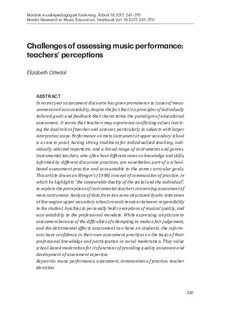| dc.description.abstract | ABSTRACT -
In recent years assessment discourse has given prominence to issues of measurement and accountability, despite the fact that it is principles of individually tailored goals and feedback that characterise the paradigm of educational assessment. It seems that teachers may experience conflicting values involving the dual roles of teacher and assessor, particularly in subjects with larger interpretive scope. Performance on main instrument at upper secondary school is a case in point, having strong traditions for individualised teaching, individually selected repertoire, and a broad range of instruments and genres. Instrumental teachers, who often have different views on knowledge and skills, informed by different discursive practices, are nonetheless part of a schoolbased assessment practice and accountable to the same curricular goals. This article draws on Wenger’s (1998) concept of communities of practice, in which he highlights “the inseparable duality of the social and the individual”, to explore the perceptions of instrumental teachers concerning assessment of main instrument. Analysis of data from two semi-structured dyadic interviews at Norwegian upper secondary schools reveals tensions between responsibility to the student, loyalties to personally held conceptions of musical quality, and accountability to the professional mandate. While expressing scepticism to assessment because of the difficulties of attempting to make a fair judgement, and the detrimental effects assessment can have on students, the informants have confidence in their own assessment practices on the basis of their professional knowledge and participation in social moderation. They value school-based moderation for its functions of providing quality assurance and development of assessment expertise.
Keywords: music performance, assessment, communities of practice, teacher identities | nb_NO |
